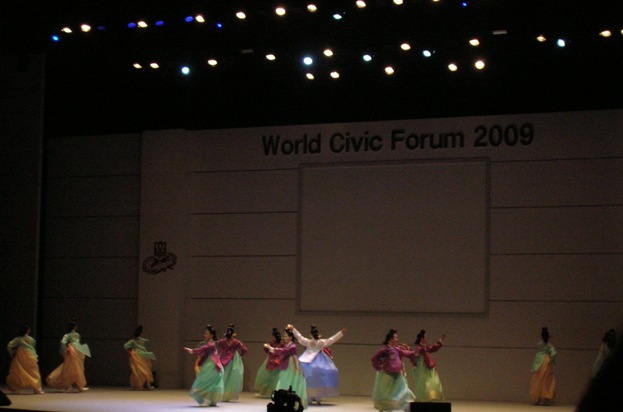Voices from the Sylff Community
Sep 1, 2009
A Marriage of Convenience: Filipina Domestic Workers and the Singaporean State
Last month I flew to South Korea to participate as a paper presenter and panel chair in the World Civic Youth Forum (WCYF) 2009. The WCYF is a programme of the World Civic Forum 2009, organised by Kyung Hee University in cooperation with the United Nations Department of Economic and Social Affairs. This year the conference was held at the Global Campus of Kyung Hee University from 5-8 May.
 WCYF provided an excellent forum for me to present a paper I have prepared for my Masters degree in Gender and Development at the Institute of Development Studies, University of Sussex. My paper considers the case of Filipina migrant domestic workers in Singapore.
WCYF provided an excellent forum for me to present a paper I have prepared for my Masters degree in Gender and Development at the Institute of Development Studies, University of Sussex. My paper considers the case of Filipina migrant domestic workers in Singapore.
I became interested in the subject of women's migration for domestic work long before studying for my Masters degree. I was particularly interested in women's experiences of long distance migration and their treatment in the destination country. I have visited Singapore a number of times to visit family there, and observing the 'maid culture' during my visits has made me keen to research this topic to satisfy my own curiosity.
The subject of domestic workers is a 'hot topic' in many prosperous Asian countries. In Singapore, it is estimated that one in seven households employs a live-in domestic worker, representing a demand for maids which has increased in Singapore since the late 1970s. There are around 150,000 female domestic workers in Singapore, around 63,000 of which are Filipino nationals; however this does not include the large numbers of undocumented workers.
The trend of female labour migration from the Philippines takes place against a backdrop of a changing Asia, a region which is undergoing considerable transformation. Singapore, a small city-state with a population of around 4.84 million, represents an important hub within this region, acting (alongside Hong Kong) as a leader in the economic markets and the global knowledge economy. The country has seen considerable social, political and economic change since the 1960s under the leadership of the People's Action Party, which has been in power since Singapore's achievement of self-government in 1959. Processes of rapid urbanisation, and a shift from light manufacturing to high technology industries, have meant profound changes for most Singaporeans.
 With the rapid entry of women into paid employment, demand for domestic help has been significant and sustained, and has ensured the survival of 'dual career partnerships'. The unwillingness of local women to undertake paid domestic work has also contributed to the steady flow of migrant labour entering Singapore. Gendered divisions of labour have not significantly altered with the increase of women in paid work, resulting in middle class women juggling a 'double day' of both productive and reproductive labour.
With the rapid entry of women into paid employment, demand for domestic help has been significant and sustained, and has ensured the survival of 'dual career partnerships'. The unwillingness of local women to undertake paid domestic work has also contributed to the steady flow of migrant labour entering Singapore. Gendered divisions of labour have not significantly altered with the increase of women in paid work, resulting in middle class women juggling a 'double day' of both productive and reproductive labour.
The failure of the state and the private sector to provide adequate child and elder care has meant that large numbers of working women have sought live-in maids to provide a substitute caregiver for their children or elderly relatives. This demand for reproductive labour results in the 'commoditisation of caring', and more specifically, a commoditisation of motherhood. Both kin work and domestic duties are transferred to the market to deal with this 'crisis of care'. Accompanying the increase of women in professional employment during the 1990s were a number of demographic changes including declining birth rates, later marriages and increased life expectancies. These changes have caused considerable anxiety to the Singapore government.
The demand for domestic workers has been met by the state through open door immigration policies for domestic migrant workers; however, in recent years there has been reluctance on the part of the government to encourage dependence on foreign workers. This ambiguity around the role of domestic workers is reflected in contradictory policy. The government has introduced a number of measures to regulate the inflow of migrant workers, in an attempt to curb dependency on maids by those who do not really 'need' them, namely non-professional, less educated women who the state would prefer to be in engaged in waged employment rather than childbearing. Regulatory measures in Singapore include restrictions on number of maids per household, short term work permits for domestic workers, and extra costs payable to the government by employers.
Government discourse has represented the 'invasion' of other cultures and races as a threat to economic success and state authority, with the Philippines in particular being represented in a negative light. Foreign workers in Singapore in some ways embody the possibility of this invasion of difference. In this sense, state-constructed hegemonic forms of masculinity are associated with hegemonic forms of racism, enacted by feminising and pacifying those dominated.
The consequences of this internalised orientalism for female migrant workers are significant. Female foreign workers in particular are seen as a threat to national security by virtue of their 'foreignness', as well as a threat to Singaporean society itself, by virtue of their sexuality. The potential of maids to unravel the moral fibre of society is a point of considerable anxiety, and is reflected in the state-owned press, and by employment agencies.
Violations of domestic workers' privacy and personal freedom are officialised in immigration policies which contravene international human rights standards. Government policies such as compulsory regular medical checks for domestic workers (including pregnancy and HIV tests), and restrictions on domestic workers' rights to marry freely are framed in the familiar rhetoric of the danger of moral collapse. In this sense, the sexuality of both local women and foreign women has become a 'target of state discipline', through pro-natalist policies for the former and restrictive labour policies for the latter.
The government has taken on minimal responsibility for the welfare of its foreign workers, for example by refusing to regulate maids' wages and instead leaving them to be determined by market forces. Domestic workers (unlike other foreign workers) are excluded from Singapore's main labour laws, the Employment Act and the Workmen's Compensation Act, which guarantee workers 'a minimum of one rest day per week, a maximum of forty-four work hours per week, limits on salary deductions, and fourteen days of paid sick leave'. Whilst the working conditions of domestic workers have been improved by some recent changes to legislation, there remains a disturbing lack of legal protection for privately employed live-in maids.
In Singapore, we therefore see that gender, nationality and class intersect to justify a persons' involvement in domestic work. The international transfer of care giving therefore creates a 'two-tier hierarchy' established through a racial division of reproductive labour. Privileged female citizens of rich nations such as Singapore are therefore able to 'have it all' through the exploitation of lower status women as cheap labourers. The 'foreignness' of migrant workers, combined with the feminising and 'Othering' of the Philippines absolves the state of its responsibilities and legitimises the exploitation of migrant workers. However, interventions to protect the rights of domestic workers must involve both sending and receiving countries, as well as the international community.
Some actions which could be taken by the Singaporean government to improve the situation of foreign domestic workers include:
- Ensure domestic workers can access equal and complete legal protection
- Enforce policies which help to prevent abuses of workers, and create mechanisms to monitor abuses, with strong penalties for those who offend
- Improve foreign workers' access to the justice system
- Ensure domestic workers' freedom of movement, including access to new job opportunities
- Sign and commit to international human rights agreements which protect the rights of migrants
- Support NGOs in their role providing additional services to migrant workers
The WCYF gave me a great opportunity to discuss with other delegates the situation of migrant domestic workers in their own contexts. The participants contributed by sharing their experiences and knowledge of the rights of domestic workers in their own countries. During the session we discussed female migrants' ability to exercise agency, even within the most constricting of circumstances. In studying women's labour migration, one must never assume women's passive acceptance of conditions, but instead seek to understand how they engage in daily renegotiation of their roles, freedoms and status.
 I enjoyed attending the WCYF conference very much. It was especially interesting to experience a taste of Korean culture and hospitality, as I had never visited South Korea before. It was also interesting to hear many other students' presentations on a wide range of topics.
I enjoyed attending the WCYF conference very much. It was especially interesting to experience a taste of Korean culture and hospitality, as I had never visited South Korea before. It was also interesting to hear many other students' presentations on a wide range of topics.
In the future I hope to work for an organisation which promotes gender equality in all areas of women's and men's lives, including paid labour. Women's access to, and control of, income is an important element of their empowerment. I am currently working on the dissertation paper for my Masters degree, which explores how women might benefit through other income streams such as cash transfers. I hope to finish my programme in September 2009 and graduate in January 2010.
The full paper can be found at http://www.wcyf2009.org/callforpaper/sub02.html?key=singapore
Message from the Tokyo Foundation:Why don't you write an article too?
“Voices from the Sylff Community” is a space showcasing the activities and opinions of Sylff fellows and faculty members. We have received contributions from fellows and faculty members all over the world. We are looking forward to sharing YOUR voices with people around the world, including global issues with local perspective, grassroots issues requiring global attention, and your first-hand experience. For further details, please click here.
